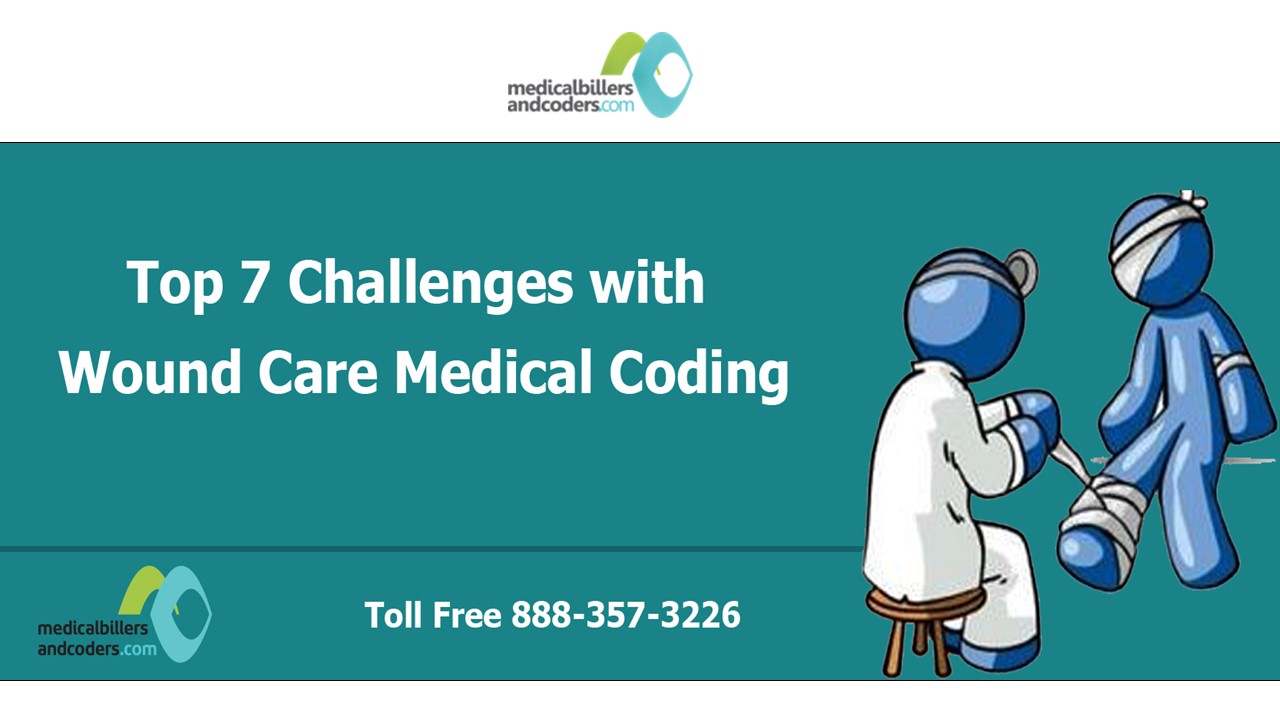Top 7 Challenges with Wound Care Medical Coding - PowerPoint PPT Presentation
Title:
Top 7 Challenges with Wound Care Medical Coding
Description:
Improve your wound care medical coding with accurate documentation and coding practices. Learn about the challenges in wound care coding. – PowerPoint PPT presentation
Number of Views:69
Title: Top 7 Challenges with Wound Care Medical Coding
1
(No Transcript)
2
Top 7 Challenges with Wound Care Medical Coding
Medical necessity denials traditionally focus
on high-dollar MS-DRGs, such as those for hip and
knee replacements other MS-DRGs may also soon
become targets. We have identified some of the
challenges in Wound Care Medical
Coding. Healthcare providers are likely to
perform accurate medical coding under ICD-10 and
that is when having an outsourcing medical
billing coding partner like Medical Billers and
Coders (MBC) will be beneficial.
Documentation lacks the clinical substance
necessary to support medical necessity, and it
doesnt capture a physicians clinical judgment
and medical decision-making for performing the
procedure. Doctors have been conditioned to
document excisional debridement, but if you look
at what they need for their own payment, they
need to do a lot more than that. To do wound care
medical coding for inpatients frequently
lacks sufficient documentation. It has become
crucial than ever for wound care providers to
make sure that they are doing coding to the
utmost specificity and following all the ICD-10
guidelines. While it is still unclear exactly how
forgiving CMS was under this grace period, it is
possible that some things that were working on
in the first year of ICD-10 may not continue to
be satisfactory.
3
Top 7 Challenges with Wound Care Medical Coding
- Challenges with Wound Care Medical Coding
- There is a misperception with coding and billing
is that if there is a code for a procedure or
product, the insurance plan will pay it. This is
not necessarily the case. Having a code does not
directly translate to the coverage for the
procedure, therefore, it becomes imperative to
know the rules under which you must operate is a
must. - Another common error is not using the add-on
codes properly. If removing over 20 cm2 of tissue
at a certain depth, he says to use the base code
and the add-on code. For example, if removing 28
cm2 of subcutaneous tissue, he notes the coding
would be both 11042 and 11045.
4
Top 7 Challenges with Wound Care Medical Coding
- Coders are often too cautious when assigning a
present on admission (POA) indicator for pressure
ulcers, especially when the provider does not
document the ulcer until several days after
inpatient admission. If signs or symptoms are
POA, coders can and should report an ulcer as
POA. A query may be necessary without
documentation of signs or symptoms. - ICD-10-PCS distinguishes between excisional and
non-excisional debridement. The ICD-10-PCS root
operations excision and extraction denote
excisional debridement and non-excisional
debridement, respectively. This doesnt mean that
physicians must use the term extraction, but if
documentation shows that the tissue was pulled or
stripped away, rather than cut, the debridement
is an extraction. ICD-10 will require coders to
capture laterality and more specific anatomic
wound locations. - There have been disagreements, and debates
between whats considered to be a wound versus
an ulcer. Sometimes, ICD-10 is almost like its
own language, and this is one of those
situations. Be aware of ICD-10 semantic, that
medical staff often make mistakes. While many
clinicians may interchange the terms ulcer and
wound as if they are substitutes, they are not
other words when it comes to ICD-10 medical
coding. - Physicians respond to the documents during their
administrative hours. Because manual physicians
query delays in medical coding and billing and
dont have a great response rate from physicians,
providers should consider automated physician
queries.
5
Top 7 Challenges with Wound Care Medical Coding
- Understand the difference between wound
debridement, open fracture debridement, and
active wound care coding. Also there are errors
in coding correctly when skin grafting/replacement
is involved. - The billing of wound care services usually
involves a thorough evaluation of the patients
medical record for the wound, including wound
dimensions, chronic diseases such as diabetes,
chronic ulcers, quadriplegia, and more. - It also requires detailed documentation of
procedures offered to manage the wound, follow-up
visits, initial assessments, photographs of the
wound, and ongoing progress. - To overcome these challenges and streamline your
wound care billing process, partnering
with Medical Billers and Coders (MBC) is
essential. - Get in touch with us today for expert assistance
and support. - Call us at 888-357-3226 or email us
at info_at_medicalbillersandcoders.com to get
started!


























![NOTE: To appreciate this presentation [and ensure that it is not a mess], you need Microsoft fonts: PowerPoint PPT Presentation](https://s3.amazonaws.com/images.powershow.com/5816511.th0.jpg?_=20200718068)
![NOTE: To appreciate this presentation [and ensure that it is not a mess], you need Microsoft fonts: PowerPoint PPT Presentation](https://s3.amazonaws.com/images.powershow.com/5528768.th0.jpg?_=202007270510)



